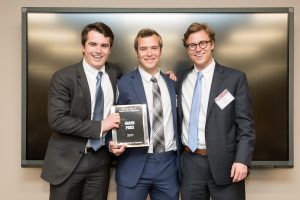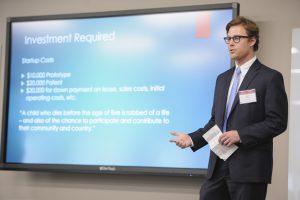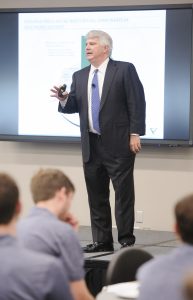
TUSCALOOSA, Ala. — Three undergraduate students at The University of Alabama are ready to take the next step in changing how life-saving medicines are stored and transported after winning the $50,000 grand prize at the Edward K. Aldag, Jr. Business Plan Competition recently at UA.
Business majors Andrew Johnson and Grant Becker and chemical engineering major Kyle Pecot are the founders of KüLVAX, a start-up company that has created a more efficient cooling process for the transportation of life-saving vaccines, particularly in developing countries that have unreliable access to ice and electricity.
The group will now pursue patents and a prototype.
The competition’s first round was held in the morning, after which the field of teams was narrowed from 40 to eight. The second round began following a speech from Aldag, the competition’s benefactor, a UA Culverhouse College of Commerce alumnus, and founder, chairman, president and CEO of Medical Properties Trust of Birmingham.
“I don’t think there are words to describe how we feel,” said Johnson, of Lake City, Florida. “It’s humbling we were able to make it to the last eight teams. There were so many incredible ideas and plans that we are extremely grateful to win this competition. We are thankful for Mr. Aldag’s generous investment toward The University of Alabama and its students, and we are excited to get our business started and moving toward profitability.”

The Alabama Entrepreneurship Institute sponsored and hosted the event at the Bryant Conference Center. AEI provides learning opportunities and mentorship to young entrepreneurs and is located at the Edge in downtown Tuscaloosa.
Pecot, of Southlake, Texas, said although KüLVAX’s viability is not yet to the level of other companies in the competition, the potential social impact was likely their most significant attribute in the final round.
“We’re talking about 30 million kids that don’t have access to basic vaccines,” Pecot said.
Johnson said desired temperatures for vaccines typically range between 2 and 8 degrees Celsius. Lack of infrastructure in electric grids in developing countries can lead to a struggle to store vaccines at these temperatures, which can lead to spoilages and undermine aid efforts.
Ice-lined coolers, the most common transportation method, have a 50 percent spoilage rate, he said.
“For reliable delivery, the cold-chain in developing countries must be insulated from the unpredictable electric grids and time constraints associated with it,” Johnson said.
“KüLVAX is essentially a cooler, and in its lid is a water storage tank, from which water runs into a cylinder and through a valve that meters the flow-rate of the water, which is calculated through a simulation of the heat loss through the cooler’s walls,” Pecot said. “When the water gets into the cylinder it mixes with a cartridge filled with a chemical compound, which, when mixed with water, keeps the cooler at a stable temperature.”

NeuroPress, which plans to license NASA technology to measure intracranial pressure to better detect and treat concussions, won the first prize of $5,000. Team members are mechanical engineering majors Matthew Mims and Lizzy West, of Vestavia Hills and Trophy Club, Texas, respectively, and aerospace engineering major Jake Zalesky, of Fort Worth, Texas.
Food Drop, a web-based grocery delivery system, took second prize and won $3,000. Team members are Ethan Mergen, a finance and hospitality management major, of Birmingham; Ryan Keelin, a finance major, of Birmingham; Trey Byers, a finance major, of Birmingham; and Jake Jackson, a math and accounting major, of Wildwood, Missouri.
Gift.me, a web site that allows customers of existing retail sites to build and store shopping profiles for multiple people, took third prize and won $2,000. Its team members are Brandon Locke, an MBA student, from Phenix City; Derek Legenzooff, a management information systems major, from Tuscaloosa; and Anna Claire Smith, a MIS major, from Woodstock, Georgia.
“The Culverhouse College of Commerce is committed to building an entrepreneurial mindset and culture,” said Dr. Kay Palan, dean of Culverhouse. “Opportunities such as the Aldag Business Plan Competition make a significant contribution to developing our young entrepreneurs at The University of Alabama. It’s critical that we partner with alumni and friends of the College to continue to provide these kinds of opportunities for our students.”
In placing in the competition’s final round, the teams will receive co-working space at The Edge in downtown Tuscaloosa.
“The event drew 40 teams from the University, and we were honored to have about 30 judges from the community and faculty helping us,” said Dr. Theresa M. Welbourne, executive director of AEI. “This is the first larger-scale business plan competition we have hosted, and we are very happy with the turnout and the high quality of all the student teams’ ideas. We wish we were in a position to fund even more of them.”
Aldag said when he started his company, he needed $250,000 – not all at once – to get it off the ground. So, with $50,000, a team like KüLVAX can “go very far.”
“When I was graduating – it’s not a whole lot different than they are now – times were hard,” Aldag said. “There weren’t nearly enough jobs to go around for everyone graduating. So, what better way to create true financial success in yourself instead of depending on someone else?
“These kids have tremendous ideas and are going to make or break this country going forward.”
Contact
David Miller, UA media relations, 205/348-0825, david.c.miller@ua.edu
Source
Dr. Theresa M. Welbourne, 205/348-8926, tmwelbourne@ua.edu
